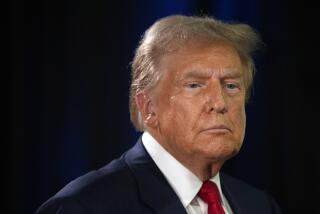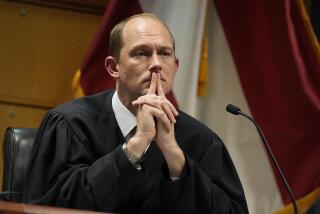Northrop’s Criminal Case Is Split Into 2 Parts : Defense: Charges that the firm defrauded the U.S. on a jet contract will be tried separately from allegations that it falsified missile tests.
- Share via
A U.S. District Court judge in Los Angeles has split the government’s massive criminal case against Northrop Corp. and four current and former employees into two parts.
Judge Pamela A. Rymer severed the government’s charges that Northrop defrauded the government by improperly testing components for the AV-8B Harrier jet fighter plane from charges that the company allegedly falsified tests on components for nuclear-armed cruise missiles. Rymer issued a 77-page order, made public Tuesday, responding to a host of pretrial motions.
She also dismissed 13 counts of the 189-count indictment on the grounds that the statute of limitations had expired on those charges. The Justice Department indicted Beverly Hills-based Northrop on 169 fraud counts in April. The indictment was later amended by the government to add 20 more counts.
Assistant U.S. Atty. William F. Fahey said the government is “generally pleased” with Rymer’s decision. “We’re very pleased that by far the great majority of the case is intact. The few counts that were dismissed were dismissed on technical pleading grounds,” he said referring to the charges that were dropped on statute of limitation grounds.
Lawyers for Northrop and some of the individual defendants declined to comment. Lawyers for the other individual defendants could not be reached.
In April, Fahey said the allegations in the indictment were among the most serious of any defense fraud case of its type because the cruise weapons were nuclear armed and because the allegedly fraudulent activity went on for 10 years. He said that if Northrop were convicted, the company would face a fine of $30 million. The individual defendants face prison terms if convicted.
Northrop immediately denied any criminal conduct.
The indictment charges that Northrop and two of the individual defendants--Charles Gonsalves, a former Northrop plant manager, and Cheryl Hannan, a former quality assurance supervisor, failed to conduct required vibration tests on components for the Harrier jets.
The other two individual defendants, Joseph Yamron, a corporate vice president and the general manager of the firm’s precision products division in Newton, Mass., and Leopold Engler, a company vice president from Massachusetts, moved to sever the charges about the Harrier from the charges about the cruise missile on the grounds that they involved different conduct at different places by different people.
In Rymer’s ruling, she explicitly severed the conspiracy count relating to the Harrier. However, her order did not state whether 61 other counts alleging false testing by Northrop on the Harrier were severed, too. Lawyers on both sides of the case said they assumed that those counts also had been severed because they related to the conspiracy count and would be the subject of a separate trial.
A status conference in the case is scheduled for next Monday, and lawyers on both sides said they hoped the point would be clarified then.
A trial in the complicated case has been scheduled for Jan. 9. It is not clear whether the charges on the cruise missile or those regarding the Harrier will be tried first .
Northrop produced the components for the cruise at its Western Services Department, a small operation in El Monte that reported to the Precision Products division in Massachusetts. The Western Services division was closed in December, 1987, after reports about faked tests became public.
The government has asserted that Engler and Yamron knew that a damping fluid used in a key component of the cruise missile would not perform at cold temperatures at high altitude but that the company continued to build the component using the fluid.
Lawyers for the company and the two men have denied any criminal activity and have asserted that the government’s case is based on an incorrect interpretation of how Northrop was to perform its contract and flawed logic, leading to invalid conclusions about what Yamron and Engler knew and did.
Defense lawyers sought to have all the charges about the cold temperature issue dismissed, but Rymer denied their motion. She did, however, narrow the issues on the cold temperature charges.
More to Read
Inside the business of entertainment
The Wide Shot brings you news, analysis and insights on everything from streaming wars to production — and what it all means for the future.
You may occasionally receive promotional content from the Los Angeles Times.










